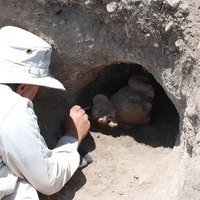Volumul Simpozionului Internaţional anual al Institutului de Filologie Română „A. Philippide” „Provocări trecute și prezente în evoluția limbii, literaturii și culturii române”, 22-24 septembrie 2021, Editura Universităţii de Vest din Timişoara, 2022
We aim to present in this article the evolution of Latin-American poetry translated into Romanian... more We aim to present in this article the evolution of Latin-American poetry translated into Romanian in the first two decades of the Communist Regime, with a methodology which is based predominantly on a distant reading, able to allow us a quantitative analysis of cultural production. We are looking into themes such as: who are the Latin American poets
translated between 1945 and 1964 or to what extent the translated verses accelerate or slow down the process of abandoning the Soviet slogans associated with the first years of communist rule. We are also interested to see if we can talk about the influence of these poets in the Romanian literary space and how the fate of their works in Romania is intertwined with the changes in politics and cultural policy of that period. We can observe that in the first stage of the Romanian communist regime, a poetry of pure propaganda is especially published, where the ideological message prevails over the artistic quality (and thus the presence of many obscure or almost forgotten poets is explained). Likewise, we can observe that the predominant figure is that of Pablo Neruda, converted into the very incarnation of the militant communist poet. In a second stage, which
corresponds to the short “cultural liberalization” between 1953 and 1956, Latin American poetry published in the Romanian media follows the line of dogmatic socialist realism, without reflecting in the least this tenuous liberalization. A great opening towards the Latin American continent is evident after the victory of the Cuban Revolution in 1959, and we can
see also that in the early years of the 1960s, Latin American poetry had an excellent diffusion in the Romanian cultural space. From the point of view of the reader’s expectations, the authors of the “Latin American Boom” which were going to be published in Romania after 1965, they were received in Romania on a fertile ground, one prepared by poets as Pablo
Neruda, Nicolás Guillén, César Vallejo, Raúl González Tuñón. Their poetry initially played the role of propaganda “noise” along with all the “progressive” literature translated from all the five continents and it slowly advanced towards the first literary discovery of Latin America in socialist Romania.











Uploads
Papers by ilinca ilian
translated between 1945 and 1964 or to what extent the translated verses accelerate or slow down the process of abandoning the Soviet slogans associated with the first years of communist rule. We are also interested to see if we can talk about the influence of these poets in the Romanian literary space and how the fate of their works in Romania is intertwined with the changes in politics and cultural policy of that period. We can observe that in the first stage of the Romanian communist regime, a poetry of pure propaganda is especially published, where the ideological message prevails over the artistic quality (and thus the presence of many obscure or almost forgotten poets is explained). Likewise, we can observe that the predominant figure is that of Pablo Neruda, converted into the very incarnation of the militant communist poet. In a second stage, which
corresponds to the short “cultural liberalization” between 1953 and 1956, Latin American poetry published in the Romanian media follows the line of dogmatic socialist realism, without reflecting in the least this tenuous liberalization. A great opening towards the Latin American continent is evident after the victory of the Cuban Revolution in 1959, and we can
see also that in the early years of the 1960s, Latin American poetry had an excellent diffusion in the Romanian cultural space. From the point of view of the reader’s expectations, the authors of the “Latin American Boom” which were going to be published in Romania after 1965, they were received in Romania on a fertile ground, one prepared by poets as Pablo
Neruda, Nicolás Guillén, César Vallejo, Raúl González Tuñón. Their poetry initially played the role of propaganda “noise” along with all the “progressive” literature translated from all the five continents and it slowly advanced towards the first literary discovery of Latin America in socialist Romania.
Abstract
This introduction to the special issue “F(r)icciones culturales entre América Latina y el Bloque del Este/Balcanes durante la Guerra Fría” summarizes, first, the disciplinary and epistemological parameters in which it is located and with which it is in dialogue. The shift from the new historiographical approaches of the Cold War is briefly pointed out, highlighting those that have dealt with its incidence in Latin America. Likewise, it mentions contributions from literary studies, especially those linked to the concept of World Literature. Second, three axes are indicated in order to delve into the study of the cultural relations of Latin American literature with European socialist countries—reception, the problem of intellectual networks and comparative poetics—and their link with the texts in the special issue is specified.
PALABRAS CLAVE: Bloque del EsteGuerra Fríahistoria latinoamericanaliteratura latinoamericanaliteratura mundialsocialismo
Keywords: Eastern BlocCold WarLatin American historyLatin American literatureWorld LiteratureSocialism
Abstract
This article studies the gradual process by which Latin American literature penetrated Romania by analysing articles, essays, and translations published in the Romanian cultural press between 1959 and 1965, when there was a gradual abandonment of the precepts of socialist realism, which had disfigured the country’s cultural space since the beginning of forced Sovietization in 1946. It shows that the Latin American literature, introduced by way of translations and reviews and practically unknown until the 1960s, became a political instrument that perfectly reflects the tensions of this era’s cultural field and, at the same time, reveals the arduous path to achieving aesthetic autonomy.
L’article se propose de présenter dans quelle mesure la littérature latino-américaine traduite en Roumanie pendant le socialisme reflète les changements survenus dans la vie culturelle, suivant les phases d’évolution du régime communiste. Si dans une première étape, qui correspond en Roumanie à la soviétisation forcée, les traductions de la littérature latino-américaine sont assez peu nombreuses et portent un poids politique considérable, avec la Révolution cubaine la littérature importée de cet espace commence peu à peu à s’alléger de cet élément dogmatique et à faire de la place à la qualité littéraire proprement dite, sans immixtion du politique. Dans la conquête graduelle de l’autonomie esthétique, la littérature latino-américaine joue un rôle de révélateur des tensions qui existent dans le champ symbolique roumain. Pendant l’étape suivante, après 1965, nous pouvons parler d’une synchronisation totale avec les autres pays de l’Occident en ce qui concerne la réception de cette littérature, qui « explose » avec le Boom dans la conscience culturelle du monde. Les traducteurs et les critiques hispanisants roumains, dans leur grande majorité des intellectuels talentueux et cultivés, réussissent, en relativement peu de temps, à présenter au public roumain une littérature qui n’est pas seulement « exotique », mais variée et vigoureuse, une littérature majeure en un mot.
Mots-clés : traductions ; politique culturelle ; réception littéraire ; littérature latino-américaine ; Roumanie socialiste.
Abstract:
The article aims to present the extent to which the Latin American literature translated in Romania during the socialist period reflects the changes that have occurred in cultural life, following the evolution of the communist regime. If in a first stage, which corresponds in Romania to forced sovietisation, the translations of Latin American literature are quite few and carry a considerable political weight, with the Cuban Revolution the literature imported from this cultural area begins little by little to diminish this dogmatic element and makes room for the pure literary quality, without political interference. In the gradual conquest of aesthetic autonomy, Latin American literature reveals the tensions that exist in the Romanian symbolic field. In the next period, after 1965, we can speak of total synchronization with the other Western countries with regard to the reception of this literature, which "explodes" with the Boom in the cultural consciousness of the world. Romanian Hispanic translators and critics, the vast majority of them talented and cultured intellectuals, succeed in relatively short time at presenting to the Romanian public a literature which is not only "exotic", but varied and vigorous, a major literature in one word.
Keywords : translation ; cultural policy; Latin-American literature; Literary Reception ; Socialist Romania.
translated between 1945 and 1964 or to what extent the translated verses accelerate or slow down the process of abandoning the Soviet slogans associated with the first years of communist rule. We are also interested to see if we can talk about the influence of these poets in the Romanian literary space and how the fate of their works in Romania is intertwined with the changes in politics and cultural policy of that period. We can observe that in the first stage of the Romanian communist regime, a poetry of pure propaganda is especially published, where the ideological message prevails over the artistic quality (and thus the presence of many obscure or almost forgotten poets is explained). Likewise, we can observe that the predominant figure is that of Pablo Neruda, converted into the very incarnation of the militant communist poet. In a second stage, which
corresponds to the short “cultural liberalization” between 1953 and 1956, Latin American poetry published in the Romanian media follows the line of dogmatic socialist realism, without reflecting in the least this tenuous liberalization. A great opening towards the Latin American continent is evident after the victory of the Cuban Revolution in 1959, and we can
see also that in the early years of the 1960s, Latin American poetry had an excellent diffusion in the Romanian cultural space. From the point of view of the reader’s expectations, the authors of the “Latin American Boom” which were going to be published in Romania after 1965, they were received in Romania on a fertile ground, one prepared by poets as Pablo
Neruda, Nicolás Guillén, César Vallejo, Raúl González Tuñón. Their poetry initially played the role of propaganda “noise” along with all the “progressive” literature translated from all the five continents and it slowly advanced towards the first literary discovery of Latin America in socialist Romania.
Abstract
This introduction to the special issue “F(r)icciones culturales entre América Latina y el Bloque del Este/Balcanes durante la Guerra Fría” summarizes, first, the disciplinary and epistemological parameters in which it is located and with which it is in dialogue. The shift from the new historiographical approaches of the Cold War is briefly pointed out, highlighting those that have dealt with its incidence in Latin America. Likewise, it mentions contributions from literary studies, especially those linked to the concept of World Literature. Second, three axes are indicated in order to delve into the study of the cultural relations of Latin American literature with European socialist countries—reception, the problem of intellectual networks and comparative poetics—and their link with the texts in the special issue is specified.
PALABRAS CLAVE: Bloque del EsteGuerra Fríahistoria latinoamericanaliteratura latinoamericanaliteratura mundialsocialismo
Keywords: Eastern BlocCold WarLatin American historyLatin American literatureWorld LiteratureSocialism
Abstract
This article studies the gradual process by which Latin American literature penetrated Romania by analysing articles, essays, and translations published in the Romanian cultural press between 1959 and 1965, when there was a gradual abandonment of the precepts of socialist realism, which had disfigured the country’s cultural space since the beginning of forced Sovietization in 1946. It shows that the Latin American literature, introduced by way of translations and reviews and practically unknown until the 1960s, became a political instrument that perfectly reflects the tensions of this era’s cultural field and, at the same time, reveals the arduous path to achieving aesthetic autonomy.
L’article se propose de présenter dans quelle mesure la littérature latino-américaine traduite en Roumanie pendant le socialisme reflète les changements survenus dans la vie culturelle, suivant les phases d’évolution du régime communiste. Si dans une première étape, qui correspond en Roumanie à la soviétisation forcée, les traductions de la littérature latino-américaine sont assez peu nombreuses et portent un poids politique considérable, avec la Révolution cubaine la littérature importée de cet espace commence peu à peu à s’alléger de cet élément dogmatique et à faire de la place à la qualité littéraire proprement dite, sans immixtion du politique. Dans la conquête graduelle de l’autonomie esthétique, la littérature latino-américaine joue un rôle de révélateur des tensions qui existent dans le champ symbolique roumain. Pendant l’étape suivante, après 1965, nous pouvons parler d’une synchronisation totale avec les autres pays de l’Occident en ce qui concerne la réception de cette littérature, qui « explose » avec le Boom dans la conscience culturelle du monde. Les traducteurs et les critiques hispanisants roumains, dans leur grande majorité des intellectuels talentueux et cultivés, réussissent, en relativement peu de temps, à présenter au public roumain une littérature qui n’est pas seulement « exotique », mais variée et vigoureuse, une littérature majeure en un mot.
Mots-clés : traductions ; politique culturelle ; réception littéraire ; littérature latino-américaine ; Roumanie socialiste.
Abstract:
The article aims to present the extent to which the Latin American literature translated in Romania during the socialist period reflects the changes that have occurred in cultural life, following the evolution of the communist regime. If in a first stage, which corresponds in Romania to forced sovietisation, the translations of Latin American literature are quite few and carry a considerable political weight, with the Cuban Revolution the literature imported from this cultural area begins little by little to diminish this dogmatic element and makes room for the pure literary quality, without political interference. In the gradual conquest of aesthetic autonomy, Latin American literature reveals the tensions that exist in the Romanian symbolic field. In the next period, after 1965, we can speak of total synchronization with the other Western countries with regard to the reception of this literature, which "explodes" with the Boom in the cultural consciousness of the world. Romanian Hispanic translators and critics, the vast majority of them talented and cultured intellectuals, succeed in relatively short time at presenting to the Romanian public a literature which is not only "exotic", but varied and vigorous, a major literature in one word.
Keywords : translation ; cultural policy; Latin-American literature; Literary Reception ; Socialist Romania.
The journal Colindancias is the result of the collaboration between professors of both Spanish language and literature from Eastern European universities, who created the Red Regional de Hispanistas de Hungría, Rumanía y Serbia (Regional Network of Hispanists from Hungary, Romania and Serbia) ) in 2009 and found an official platform for this Project thanks to the CEEPUS (Central European Exchange Program for University Studies). The main objective of this journal is to promote the scientific efforts of the professors and researches from Central and Eastern Europe, and to integrate their studies into international framework. The journal publishes investigative studies written in Spanish conducted in the aforementioned parts of Europe or in other countries. The subject matter is connected to the various fields of Hispanic studies: literature, linguistics, didactics, history, etc. A special interest is stirred by comparative studies or those capable of highlighting the relations between the Hispanic space and that of Central and Eastern Europe. This journal is an annual publication.
The journal Colindancias is the result of the collaboration between professors of both Spanish language and literature from Eastern European universities, who created the Red Regional de Hispanistas de Hungría, Rumanía y Serbia (Regional Network of Hispanists from Hungary, Romania and Serbia) ) in 2009 and found an official platform for this Project thanks to the CEEPUS (Central European Exchange Program for University Studies). The main objective of this journal is to promote the scientific efforts of the professors and researches from Central and Eastern Europe, and to integrate their studies into international framework. The journal publishes investigative studies written in Spanish conducted in the aforementioned parts of Europe or in other countries. The subject matter is connected to the various fields of Hispanic studies: literature, linguistics, didactics, history, etc. A special interest is stirred by comparative studies or those capable of highlighting the relations between the Hispanic space and that of Central and Eastern Europe. This journal is an annual publication.
The journal Colindancias is the result of the collaboration between professors of both Spanish language and literature from Eastern European universities, who created the Red Regional de Hispanistas de Hungría, Rumanía y Serbia (Regional Network of Hispanists from Hungary, Romania and Serbia) ) in 2009 and found an official platform for this Project thanks to the CEEPUS (Central European Exchange Program for University Studies). The main objective of this journal is to promote the scientific efforts of the professors and researches from Central and Eastern Europe, and to integrate their studies into international framework. The journal publishes investigative studies written in Spanish conducted in the aforementioned parts of Europe or in other countries. The subject matter is connected to the various fields of Hispanic studies: literature, linguistics, didactics, history, etc. A special interest is stirred by comparative studies or those capable of highlighting the relations between the Hispanic space and that of Central and Eastern Europe. This journal is an annual publication.